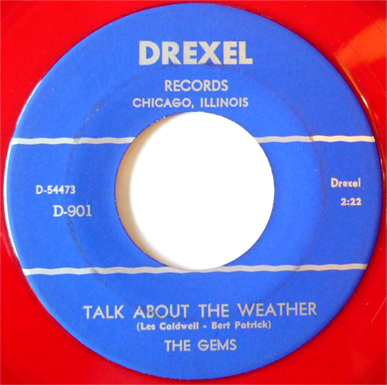
Revision note:At last we have a release date for Drexel 912 by Roy Wright: March 1957. The company started advertising again in Cash Box on March 16, 1957, after 18 months missing in action. We'd further like to note that four sides by male vocalists on Drexel have been reissued on a various-artists CD from 2018, Windy City Dandies: Beat-Me-Down Rhythm & Blues Volume 1. We've added references to Drexel releases from the trade papers, and will be continuing for a while.
Chicago's Drexel Records was a small independent label formed in mid 1954 by Paul King and Les Caldwell, along with a third undisclosed partner. Les Caldwell had previously been a salesman for King Records in Cincinnati. The venture was undoubtedly inspired by the many local black recording artists who could be heard on some of the larger Chicago independent labels such as Vee Jay, Chess, and United.
Drexel Records never had a formal business office. The company conducted its fledgling operation from Paul King's South Side home, at 7319 South Vernon. As with most independent record labels in the Chicago area, the Drexel sessions were done at Universal Recording.
An article discussing local musicians in the July 19, 1956 Chicago Defender stated that Denni Tillman was the pianist and music director for Drexel Record Corporation. Denni and his wife Dorothy were well known on the Chicago music scene during the 1950's. Denni had been showing up on the contract list maintained by Musicians Union Local 208 since March 7, 1946, when as "Dennis" Tillman he filed an indefinite contract for 2 days a week at Club Victory.
Dotty Tillman (a vocalist) did not record for Drexel, so far as we know, but in 1961 she would make two sides (which were released on two singles) for another small label, Marvello. These used Denny Tillman's trio for accompaniment (we're spelling the names here as they appeared on Marvello). As for Denni Tillman, we'll assume that he played piano on many, if not all, Drexel sides, but we don't know which other musicians he was accustomed to working with, and we are largely in the dark about the identities of the session musicians who recorded for Drexel. From composer credits, we may infer that saxophonist Bert Patrick was a participant in the early going, and saxophonist Johnny Houser a contributor a little later on. On some later sessions, saxophonist Red Holloway is audibly present. But much more research on the instrumental contributions is evidently needed.
Drexel was up and running in June 1954. An article in Billboard, bylined June 5, announced (in customary fashion) that Drexel had just released two records, 901 by the Gems and 902 by Dorothy Logan. Les Caldwell was said to be looking for distributors ("Drexel Label Set by King, Caldwell," June 12, 1954, p. 47).

The company's first project had been to record a vocal group called the Gems. The Gems all came from the same neighborhood in Evanston, Illinois, a suburb north of Chicago. They began performing together at dances and clubs in 1952, when they were all in their early 20s.
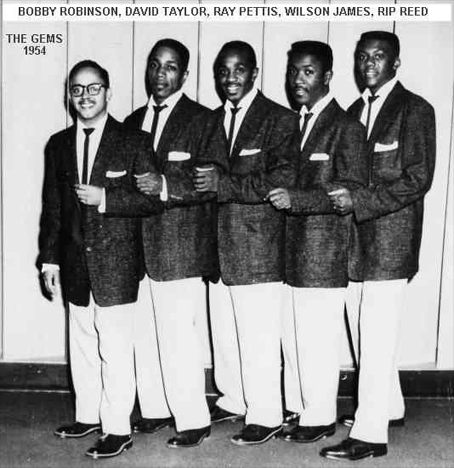
The Gems: Ray Pettis (lead), Rip Reed (bass), Bobby Robinson (first tenor), Wilson James (baritone/bass), and David Taylor (second tenor), accompanied by prob. Denni Tillman (p, dir); prob. Bert Patrick (ts); unidentified (eg); unidentified (b); unidentified (d).
Universal Recording, Chicago, early 1954
| D-54471 | Deed I Do (Rose-Hirsch) | Drexel 901 | |
| D-54472 | You're Tired of Love (Caldwell-Patrick) | Drexel 904 | |
| D-54473 | Talk about the Weather (Caldwell-Patrick) | Drexel 901 | |
| D-54474 | Ol' Man River (Kern) | Drexel 904 |
The Gems consisted of Ray Pettis (lead), Rip Reed (bass), Bobby Robinson (first tenor), Wilson James (baritone/bass), and David Taylor (second tenor). We don't know who accompanied them, but pianist Denni Tillman would later be identified as the company's music director. And sharing composer credit with Les Caldwell was Bert Patrick, a saxophonist who had been on the Chicago scene for a decade. "Talk about the Weather" has become a doowop classic, and "Deed I Do" is a top quality doowop rendition of a standard. "Weather" has a distinctive tenor sax solo that is definitely not the work of any of the prominent session players of the period, and the saxophonist weaves in and out of the ensemble during "Deed" in a very different style from another master of that craft, Red Holloway. "Weather" also includes an 8 bar solo for the pianist. The group's recasting of "Old Man River" is intriguing.
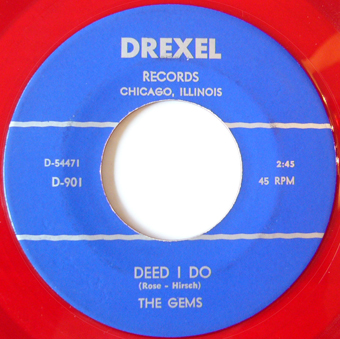
The Gems' initial effort for the label, Drexel 901, released in June 1954, was a beautiful rendering of “Deed I Do” backed by an up-tempo number entitled “Talk about the Weather”. The first 7-inch 45 rpm pressing of this record was issued only on red vinyl. A subsequent run of Drexel 901 on 45s a few months later showed a slight label design change and was pressed on black vinyl.
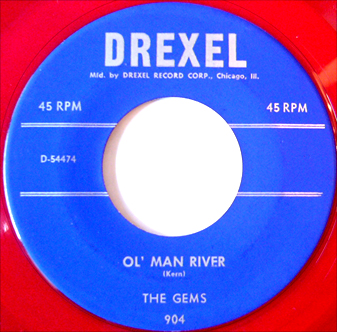
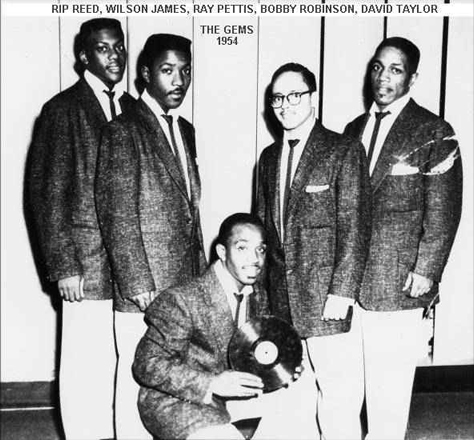
According to Joel Turnero's Stars over Harlem column in Cash Box (July 31, 1954), “from Chicago, good to see Paul King and Les Caldwell, whose Drexel record of “Let's Talk about the Weather” with the Gems is occupying so many slots on the juke boxes hereabouts” (p. 19). Turnero erroneously added “Let's” to the song title. On August 21, Cash Box's Rhythm n' Blues Ramblings was still hopefully declaring, "'Let's Talk About The Weather" by the Gems on Drexel is starting to move fast here" (p. 21). Still, the record was never reviewed in Billboard or in Cash Box.
Meanwhile, Caldwell had landed at least one distributor: United, in Chicago. Drexel was alongside Duke, Parrot, RPM, and Prestige in a United Distributors ad for July 3, 1954 (Cash Box, p. 59). George and Ernie Leaner seem to have stood by Drexel as long as it was in business. Did the company ever get any other distributors?
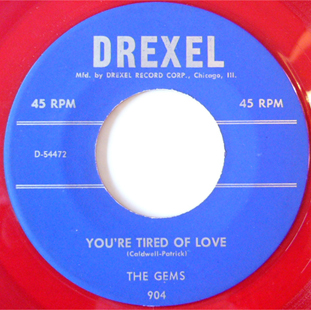
“Ol' Man River” b/w “You're Tired of Love” from this session appeared on the Gems' third release, Drexel 904. According to Goldberg and Stallworth, it came out in June 1955. Drexel 904 was issued on 78 and 45 rpm, but the 45s were pressed on red vinyl only.
There are 45-rpm "repros" of both 901 and 904. These are easy to recognize because they don't have the correct master numbers incised in the vinyl. They also lack the two or three-digit codes used by the original pressing plants (similar codes can be seen on Chess, Chance, and Parrot records pressed in the Chicago area during this period).
Bert Patrick had been on the scene since the mid-1940s. Local 208 posted his contract with the Irish Village on February 15, 1945. That year he even recorded as a leader for John Steiner's SD label, though the session was never issued and has probably been lost. It included a number titled "I Talk about the Weather."
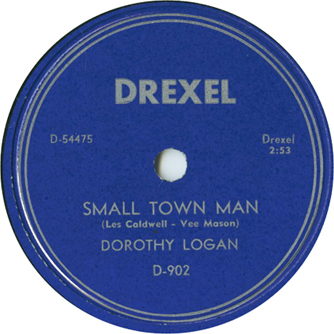
Dorothy Logan (voc) with The Gems (voc -1); accompanied by prob. Denni Tillman (p, dir); prob. Bert Patrick (ts); unidentified (eg); unidentified (b); unidentified (d).
Universal Recording, Chicago, early 1954
| D-54475 | Small Town Man (Caldwell-Mason) | Drexel 902 | |
| D-54476 | Since I Fell For You (Buddy Johnson) -1 | Drexel 902 |
Drexel 902 saw another Evanston vocalist, Dorothy Logan, singing a good slow blues called “Small Town Man.” She was backed on the flipside by the Gems with a nice version of the R and B classic “Since I Fell For You”. Both sides used the same band to accompany the singers. The same tenor saxophonist who can be heard on the Gems' sides is responsible for a quick introduction and brief responses to the vocal line during "Fell" and takes a strong full chorus solo on "Small Town Man."
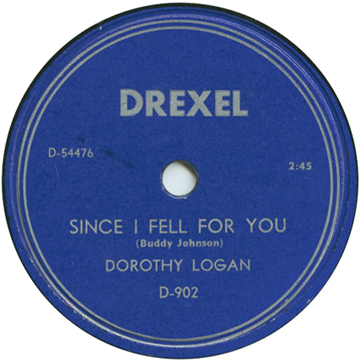
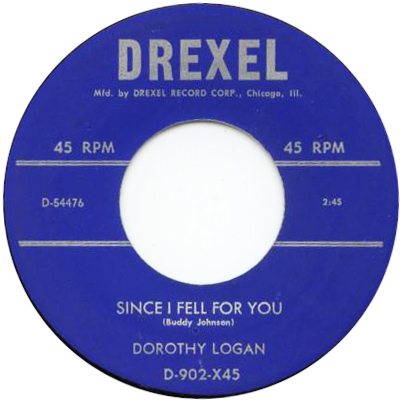
It appears that the Dorothy Logan sides were done at the same session as the first four by the Gems. Her single was also released in June 1954. It got a mediocre review in Cash Box on August 28, 1954 (p. 22). One wonders to what extent the rating was lowered because of Drexel's minuscule operation and weak distribution.
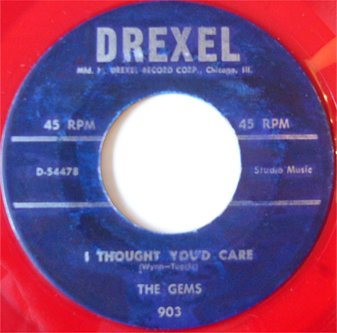
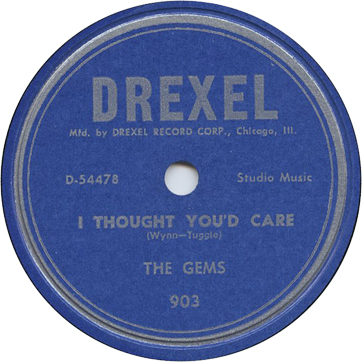
The Gems: Ray Pettis (lead), Rip Reed (bass), Bobby Robinson (first tenor), Wilson James (baritone/bass), and David Taylor (second tenor), accompanied by prob. Denni Tillman (p, dir); prob. Bert Patrick (ts); unidentified (b); unidentified (d).
Universal Recording, Chicago, 1954
| D-54478 | I Thought You'd Care (Wynn-Tuggle) | Drexel 903 | |
| D-54480 | Kitty From New York City (Caldwell) | Drexel 903 |
The Gems' next effort appeared as Drexel 903, “I Thought You'd Care” b/w “Kitty From New York City.” Drexel 903 was issued on 78 and 45 rpm; the 45's were pressed on red vinyl only. Drexel 903 was released in January 1955. It was reviewed in Cash Box on February 5, 1955 (p. 28); the reviewer preferred "Kitty from New York City." Goldberg and Stallworth place the recording session in the summer of 1954.
The instrumental lineup on these two items is similar to what we hear on the first Drexel session (Drex1 and 2 above), but the sonics on the releases are a little different. We'll assume that this session was a follow-up to the first one.
Drexel 903 has also been reissued on 45 as a bootleg "repro."
"I Thought You'd Care" attracted attention from another record company. In January 1956, Mercury included it in a session by the Skyscrapers. Mercury 70795 would be the last release by the Browley Guy-led vocal group, which by then had been on the Chicago scene for a decade and sounded a lot more old-fashioned than The Gems.
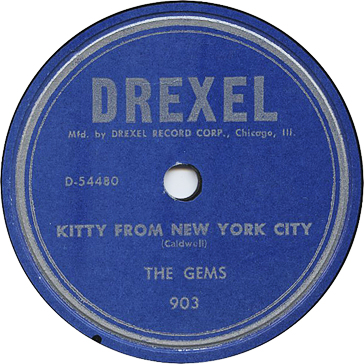
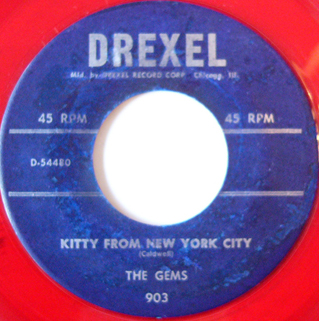
Two matrix numbers, 54477 and 54479, did not appear on any known Drexel release. they may have belonged to unissued sides by the Gems. We of course don't know whether anything of the sort survives.
An indication that Drexel wasn't pulling in a lot of money—in January 1955, Les Caldwell returned to record sales and distribution (maybe he'd never left it, just changed employers). "Morry Goldman of James H. Martin, Inc., called to report that they are now handling the Specialty label. Morry also reports the appointment of Leslie F. Caldwell as sales rep. for R & B territory here in Chicago" (Cash Box, January 15, 1955, p. 23). Jimmy Martin's operation had carried some R & B lines in the past but was better known for white pop music and polkas, hence the felt need for more help with rhythm and blues.
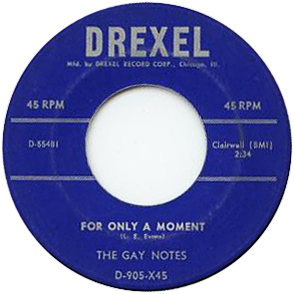
The Gay Notes (voc); accompanied by prob. Denni Tillman (p, dir); prob. Bert Patrick (ts); unidentified (eg); unidentified (b); unidentified (d).
Universal Recording, Chicago, 1955
| D-55481 | For Only a Moment (L. E. Evans) | Drexel 905 | |
| D-55482 | Pu Pu Pa Doo (L. W. Evans) | Drexel 905 |
The only other vocal group to record for Drexel was the Gay Notes. Their recording was released in August 1955 as Drexel 905, “For Only a Moment” b/w “Pu Pu Pa Doo”.
We can pin the release down to the month of August because on September 3, 1955 Cash Box reviewed two Drexels: 905 and 906 (both on p. 24). The reviewer was complimentary to the Gay Notes' single, giving a higher rating to "Pu Pu Pa Doo."
The members of the group were from Chicago but remain unidentified. The Gay Notes were rougher sounding and had a very different style from the Gems. "Pu Pu Pa Doo" is catchy; "For Only a Moment," complete with monologue in the middle, verges on self-parody. The Gay Notes may have shared their session with the Gems.
There are bootleg "repros" of 905 on 45 rpm; as usual, these lack the original matrix and pressing plant numbers in the vinyl.
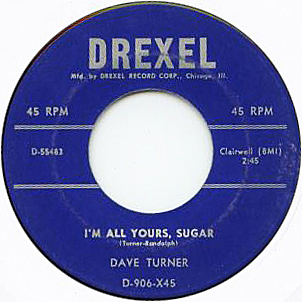
Dave Turner (voc); prob. Denni Tillman (p, dir); prob. Bert Patrick (ts); unidentified (eg); unidentified (b); unidentified (d).
Universal Recording, Chicago, 1955
| D-55483 | I'm All Yours, Sugar (Turner-Randolph) | Drexel 906 | |
| D-55484 | Atlantic Boardwalk (Caldwell-Patrick) | Drexel 906 |
About Dave Turner we have learned a bit, based partly on a fact-anemic profile that ran in the Chicago Defender on January 12, 1960, and partly on Queen: The Life and Times of Dinah Washington, by Nadine Cohodas. Turner was Chicago-born, and by 1956 was regularly appearing in Chicago clubs as a comic, emcee, and singing mimic (much like fellow Chicagoan George Kirby). In the summer of 1958, he joined the Bill Doggett band when they came through Chicago to perform at Roberts' Show Lounge, touring and working over three years with the combo. (He did not record with Doggett, whose records during that period were all instrumental.) In October 1961, he joined the Dinah Washington revue, working mainly as a comic (he replaced Slappy White in that role). Reportedly while on a 1962 European tour with the Queen he made an LP called Dave Turner in Europe, and was said to have recently waxed a single in the United States called “There I've Said it Again” and “You'll Never Know.” The two songs are well-known ballad standards. In January 1963, Turner was romantically linked with Dinah, with whom he spent some vacation time in Puerto Rico, and Defender gossip columnists were projecting him as future husband number nine (had they married legally, he would have been number 7). A few weeks later another column duly reported on their breakup. Turner was kicked out of Dinah Washington's revue in February. When Dinah Washington died suddenly in December 1963, he sent a telegram of condolence. Thereafter, nothing more was heard about Dave Turner.
Drexel 906 was also out in August 1955; Cash Box reviewed it on September 3 (p. 24), a touch less enthusiastically than the Gay Notes' release.
The credit to "Randolph" on "I'm All Yours, Sugar" suggests that Dave Turner collaborated with Hattie Randolph on the tune—and cut his two sides at the same session as her two. The instrumentation is the same as on her two numbers. On "I'm All Yours," the guitarist and the tenorist each get short solos; the guitarist nets a more generous allocation on "Atlantic Boardwalk."
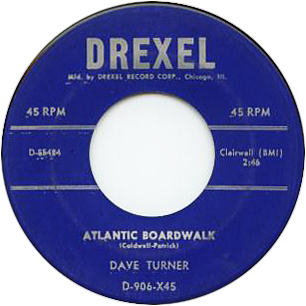
The 45 rpm release of Drexel 906 is the last one that we have seen to carry a suffix indicating the format. This is not because the company had gone over exclusively to 45s. 78-rpm pressings are attested through Drexel 916.
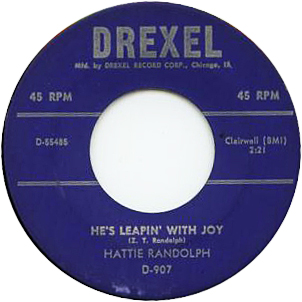

Hattie Randolph (voc); prob. Denni Tillman (p, dir); prob. Bert Patrick (ts); unidentified (eg); unidentified (b); unidentified (d).
Universal Recording, Chicago, 1955
| D-55485 | He's Leapin' with Joy (Z. T. Randolph) | Drexel 907 | |
| D-55486 | Later On in Life (Caldwell-Randolph) | Drexel 907 |
Concerning Hattie Randolph, we have some facts to work with. Born on December 9, 1932 in Chicago, Hattie was the daughter of early jazz trumpet player Zilner T. Randolph (1899-1994) and the older sister of trumpet player Lucious Randolph (1935- ); there were 7 Randolph siblings in all. Zilner Randolph played and recorded in one of Louis Armstrong's first big bands (1931), and wrote "Old Man Mose," which Armstrong recorded in 1936. In the 1950s, he was leading the house band that backed the midnight shows at the Indiana Theater. Hattie Randolph's first recording was a limited-edition release with a Randolph family band, which was billed as Two Honeys and a Cone; she sang the lead on "So Worried," on Blue House 1 (which was recorded in early 1949 at United Broadcasting Studio, with her sister Regina and her brother Lucious). Two Honeys and a Cone recorded again for Chess in 1952, although Hattie was also appearing on her town by that time. Her father also wrote one of her Drexel sides ("He's Leapin' with Joy").
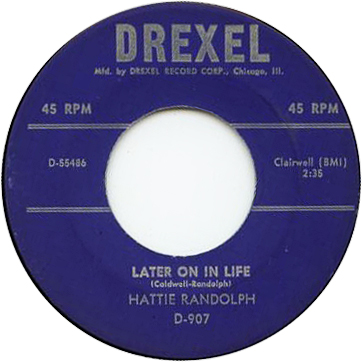
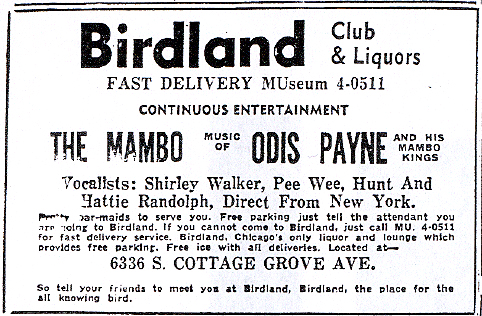
In December 1954 she was singing at a short-lived South Side establishment called Birdland (not the same as Cadillac Bob's establishment, which opened a year later and soon changed its name to Budland). In October 1955 she was featured in a revue at the Rena Theater, a West side establishment that had opened earlier that year. Her two Drexel sides were probably recorded in 1955.
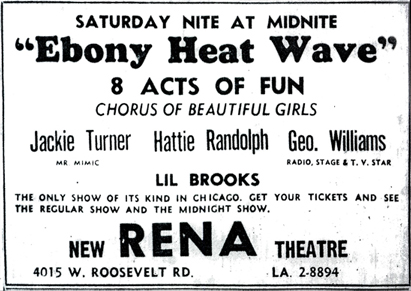
"He's Leapin"" is a superior piece of jazz songwriting; it features tricky rhythms (including a lot of stop-time) and changes key twice, so the vocal line ends much higher than it began. Hattie Randolph handles the range with no signs of discomfort. The guitarist and the tenor saxophonist both solo on it.
Though Hattie Randolph's Drexel single went nowhere, she remained active in Chicago during the late 1950s. In 1957, she began singing on occasion with Sun Ra, recording three tracks with a trio that finally saw release in 1973. She went on at least one tour of Indiana with Sun Ra's band. Finally, she contributed two vocals to the legendary studio session of March 6, 1959, by a full Arkestra featuring Hobart Dotson on trumpet. Her versions of "'Round Midnight," now regarded as a classic, and "Back in Your Own Backyard" were reportedly released on a Saturn single in 1959 (this still needs verifying) and definitely on a Saturn LP in 1970. Later in 1959, Hattie Randolph would move to Winnipeg, Manitoba, leaving the music scene for many years. It was when the early Saturn LPs were reissued on CD in 1992 and 1993 that Hattie Randolph was finally introduced to a worldwide audience.
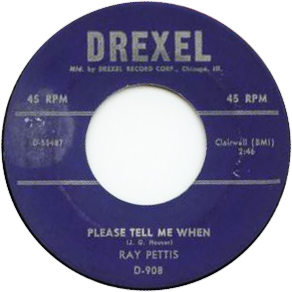
Ray Pettis (voc); prob. Denni Tillman (p, dir); prob. Johnny Houser (ts); unidentified (b); unidentified (d).
Universal Recording, Chicago, 1955
| D-55487 | Please Tell Me When (J. G. Houser) | Drexel 908 | |
| D-55488 | Ow' You're So Fine (Houser-Caldwell) | Drexel 908 |
Drexel also decided to release two single recordings by Ray Pettis (who was born on October 19, 1930) without the Gems. These were titled “Please Tell Me When” b/w “Ow, You're So Fine” along with the more pop-oriented “Does It Have To Be Christmas” b/w “Christmas Here, Christmas There”. Goldberg and Stallworth place the recording session for the first two in 1955 and the release date for Drexel 908 around August of 1956. Yet to be resolved is whether Drexel 908 was recorded at the beginning or the end of sessions by the Gems—as the matrix numbers suggest they could have been—or on separate occasions.
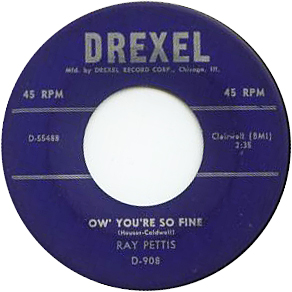
The Houser who gets composer credit on both sides is surely Johnny Houser, a veteran musician on the Chicago scene who, by this time, played alto and tenor saxophones and flute (he was sometimes billed as "Mr. Versatile"). Back in 1944, Houser'd had the unenviable job of playing lead alto in the notorious Rhumboogie "dream band" while the second alto, an out-of-towner named Charlie Parker, was giving the bandleader hell (see our Tom Archia page for details). In 1956 and 1957, Houser would be the featured soloist in the "rock and roll" quartet led by drummer Richard Ingram; the group enjoyed a couple of long runs at Duke Slater's Vincennes Lounge.
"Ow' You're So Fine" is a jazzy number with a brief solo for the tenor saxophonist, probably Houser himself. "Please Tell Me When" is a lounge ballad, with some cocktail piano runs and some pop answering phrases from the guitar in the understated accompaniment. The subtone vamp that opens and closes the tune is more interesting.
Goldberg and Stallworth note that a bootleg single—produced in 1975 according to some sources, and in the 1980s according to others—took the two Pettis sides, overdubbed a newly recorded vocal group on each, retitled 55487 as "I Can't Believe," mispunctuated the title of 55488, and reversed the labels. The bogus release appeared as "Drexel 900." The same doctored recording appeared on Broadcast 995, which McGrath says was released in 1972, which could be the date of origin for this bit of bogosity. According to McGrath, the Broadcast uses the correct title for "Please Tell Me When."
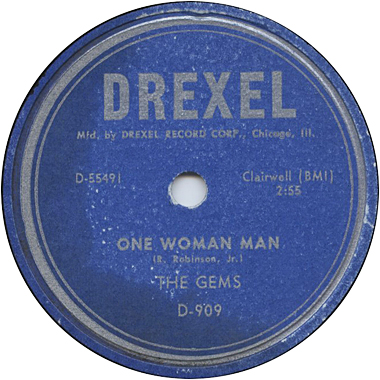
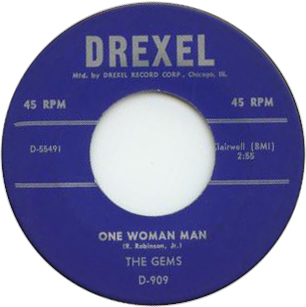
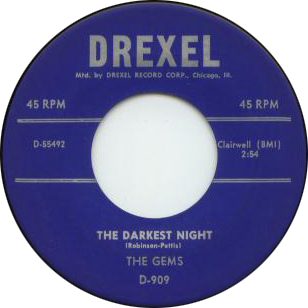
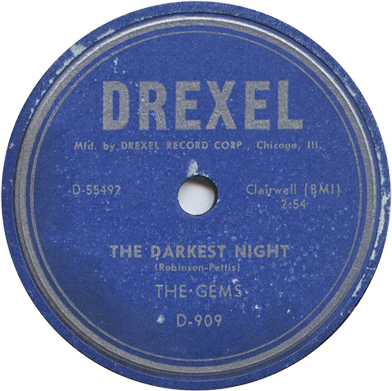
The Gems: Ray Pettis (lead), Rip Reed (bass), Bobby Robinson (first tenor), Wilson James (baritone/bass), and David Taylor (second tenor), accompanied by prob. Denni Tillman (p, dir); Red Holloway (ts); unidentified (bars); unidentified (eg); unidentified (b); unidentified (d).
Universal Recording, Chicago, 1955
| D-54489 | Till The Day I Die (R. Robinson, Jr.) | Drexel 915 | |
| D-54490 | Monkey Face Baby (R. Pettis) | Drexel 915 | |
| D-55491 | One Woman Man (R. Robinson, Jr.) | Drexel 909 | |
| D-55492 | The Darkest Night (Robinson-Pettis) | Drexel 909 |
The third and last session by the Gems took place in 1955 (the company handled the prefixes inconsistently on the the two releases that came out of it). From the tenor sax solo on "Monkey Face Baby," there is little doubt that Drexel was employing the services of Red Holloway on this occasion. Red's brief ballad solo on "The Darkest Night" says it all with a handful of notes.
Releases from this session were substantially delayed. The first single, Drexel 909, coupled an outright soul number, "One Woman Man," with the ballad, "The Darkest Night"; it was released in October 1956. According to Goldberg and Stallworth, it enjoyed some local sales, reaching number 17 on the Top 40 survey at radio station WGES. Paul King advanced $5 to each member of the group. All this seems to have achieved was persuading the Gems to break up. Without a manager, the group had never gotten much in the way of publicity or club bookings.
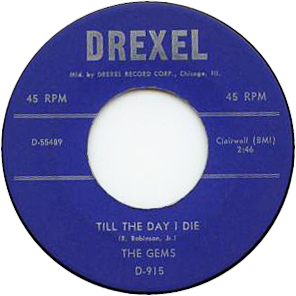
The second from this session, Drexel 915, came out around June 1957, by which time the Gems were history. The company actually bought ads in the trade papers for it, though to little avail. "Till the Day I Die" is a solid ballad, and "Monkey Face Baby" a boisterous jump in what by then was a dated style.
Like the other Drexel vocal group records, 909 and 915 have been duly reproed on 45s.
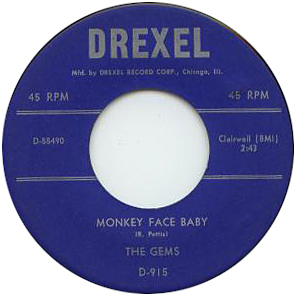
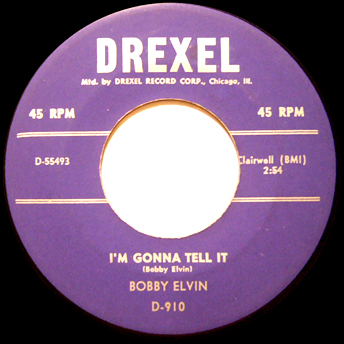
Bobby Elvin (voc); accompanied by prob. Denni Tillman (p, dir); unidentified (ts); unidentified (bars); unidentified (eg); unidentified (b); unidentified (d).
Universal Recording, Chicago, prob. 1955
| D-55493 | I'm Gonna Tell It (Elvin) | Drexel 910 | |
| D-55494 | The Blind Boy (Elvin) | Drexel 910 |
Singer Bobby Elvin's first session probably led to a release in 1956. Elvin, about whose background we know nothing, was an R and B singer out of the standup blues heritage, like a younger Clarence Samuels or Grant Jones. There is an incipient strain of soul music in his compositions. King and Caldwell must have had pretty high expectations of him, as they would end up recording him on three separate occasions.
The band on this session is much louder and edgier than the ensemble that backed Dorothy Logan and the Gems the previous year. There are two saxes now, a tenor and a baritone, and the guitarist, who verges on rock and roll (hear the introduction to "The Blind Boy"), battles the pianist for supremacy. The tenor saxophonist solos on "The Blind Boy," using a much rougher attack than his counterpart on the label's first session. It could be Cliff Davis or Johnny Houser; the former can be heard on a number of sessions for other labels during this period, and the latter, who would soon be featured in what was billed as a rock and roll band, was involved in some capacity with the first Ray Pettis session.
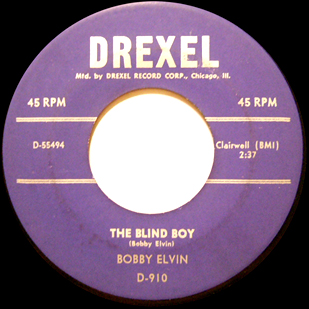
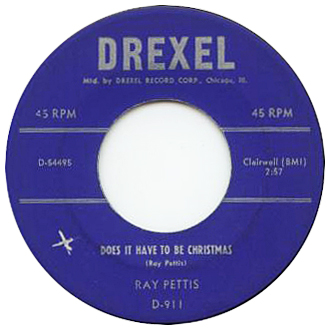
Ray Pettis (voc); accompanied by a studio band: unidentifed (tbn); unidentified (ts); unidentified (bcl); unidentified (p -1); 3 unidentified (vln); unidentified (vla); unidentfied (clo); unidentified (b); unidentified (d).
Universal Recording, Chicago, prob. 1956
| D-54495 | Does It Have To Be Christmas (Pettis) | Drexel 911 |
| D-54496 | Christmas Here, Christmas There (Roy Wright) -1 | Drexel 911 |
The last recording session by Ray Pettis took place at an uncertain date. Pettis indicated to Goldberg and Stallworth that it was done all the way back in the fall of 1954. With five strings and a bass clarinet, this sounds like a separate date for which a bunch of studio musicians were brought in; it would be interesting to know who did the arrangements. If this was really done in 1954, then the company was messing with its matrix numbers after the fact. Drexel 911 came out in November 1956.
The composer credit on one side went to Roy Wright, presumably the same singer who would shortly be also recording for the company.
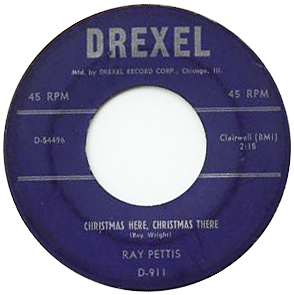
After the Gems broke up, Ray Pettis took over as the lead of another Evanston-based vocal group called the Foster Brothers. Although its style already came across as dated in 1956, the group recorded for John "Lawyer" Burton's El Bee label that same year, for a tiny label called Hi Mi (1958), for Mercury (the Foster Brothers' only effort for a major company—also 1958), for Mel London's Profile label in 1959, for Bud Brandom's B&F label in 1960, and finally for another boutique label called Dillie (also 1960). As a soloist, Pettis recorded for the Boss and Dee Dee labels (which were co-owned by former Gem Bobby Robinson). He was on singles for Boss released in 1962 and 1963, and on one side of a single for Dee Dee (1963). After a single for Salem (not the Mort Hillman label) in 1965 and one for Exodus (run briefly by Jimmy Bracken and Vivian Carter after Vee-Jay went bankrupt, 1966), Pettis recorded his last two singles for Dee Dee in 1969. Ray Pettis died on December 12, 1991, in Evanston, Illinois.
Today Renda Pettis, the younger of Ray's two daughters, is a talented singer, actor, and choreographer. She has had significant roles in musical and stage productions of “Eubie”, “Aint Misbehavin”, and “Sophisticated Ladies”. She also choreographed the 25th NAACP Image Awards, in addition to making regular appearances on the TV shows “Will and Grace”, “Sparks”, and “The Drew Carey Show”. Renda Pettis appeared in the 2005 Sony film, “Rent”.
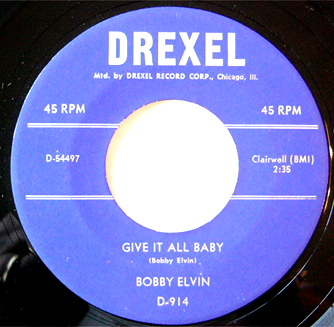
Bobby Elvin (voc); accompanied by prob. Denni Tillman (p, dir); John Avant (tb -1); Red Holloway (ts); unidentified (bars); unidentified (eg); unidentified (b); unidentified (d).
Universal Recording, Chicago, January or February 1957
| D-54497 | Give It All Baby -1 (Elvin) | Drexel 914 | |
| D-54498 | Think a While (Elvin) | Drexel 914 |
Bobby Elvin's next release, on Drexel 914, took place in April 1957. Cash Box ran an ad for it on May 25, 1957 (p 98). The release number was misstated, as 912. Drexel 912 was by Roy Wright and it had already been released. There never was a Drexel 913. The matrix numbers on Drexel 914 carry the 54- prefix, but the company had already used 55- and had never bothered opening a 56-. Did Bobby Elvin record on the same date as Ray Pettis (Drex10 above) or Roy Wright (Drex12 below)? Four-tune sessions were still the norm when these sides were cut. Our money is on the Roy Wright date (Drex12).
"Give It All Baby" is a blues with a Latin rhythm that alternates with straight 4/4. Red Holloway solos over the 4/4, followed by a surprise trombone soloist, in the J. J. Johnson mode. This is almost surely Johnny Avant, who did a lot of session work during the mid to late 1950s. The pleading "Think a While" features a solo by Red Holloway and some prominent accompainment by the guitarist.
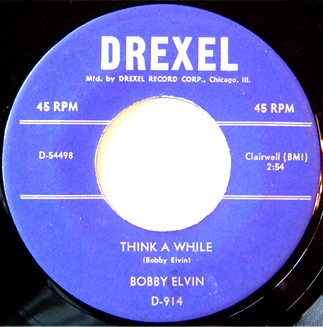
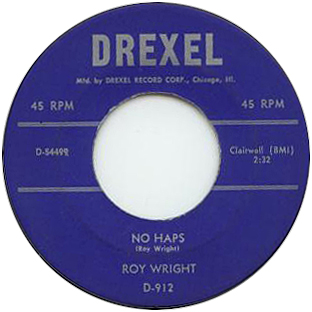
Roy Wright (voc); accompanied by prob. Denni Tillman (p, dir); prob. John Avant (tb -1); Red Holloway (ts); unidentified (bars); unidentified (eg); unidentified (b); unidentified (d).
Universal Recording, Chicago, January or February 1957
| D-54499 | No Haps (Wright) | Drexel 912 | |
| D-54500 | I'm Lonely -1 (Wright) | Drexel 912 |
Roy Wright, a high tenor, is another singer about whom we know nothing. He attracted the company's interest at the end of 1956 or the beginning of 1957. Wright had already written a tune for Ray Pettis' last session. We figure Drexel brought him into the studio in January or February 1957, despite the retention of the 54- prefix. Drexel 912 was out in March.
The company, after 18 months of no mentions whatsoever, put a blurb in Cash Box for Drexel 912 (March 16, 1957, p. 40). The company even sprang for three advertisements (March 16, p. 46; March 30, p. 47; April 6, 1957, p. 41). On April 6, George Leaner of United Distributors told Cash Box (p. 38) that "No Haps" was moving for him. He apparently mentioned the record in the same breath as "Bad Boy" by the Jive Bombers. We may be pardoned for doubting it was selling that well.
"I'm Lonely" is a New-Orleans-inflected blues. The trombonist who reinforces the saxes is presumably Johnny Avant again; these two sides appear to have been made at the same session as the preceding two by Bobby Elvin. Red Holloway is prominent on this session, and the guitarist is unobtrusive. The rollicking "No Haps" is a rocker that could have been written for Big Joe Turner; it features a long tenor sax solo by Red.
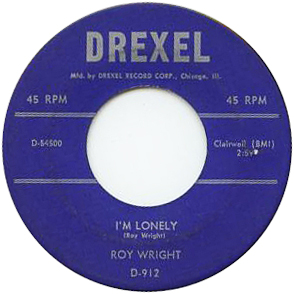
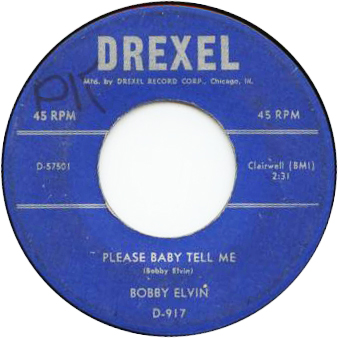
Bobby Elvin (voc); accompanied by unidentified musicians.
Universal Recording, Chicago, 1957
| D-57501 | Please Baby Tell Me (Elvin) | Drexel 917 | |
| D-57502 | You're My Girl (Elvin) | Drexel 917 |
With Bobby Elvin's third session and last release for Drexel, the prefixes finally caught up: the sides were recorded and released in 1957.
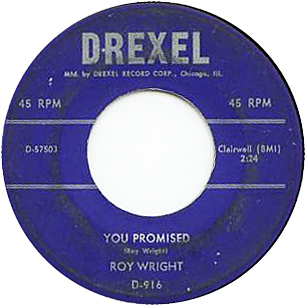
Roy Wright (voc); accompanied by prob. Denni Tillman (p, dir); prob. Red Holloway (ts); unidentified (bars); unidentified (eg); unidentified (b); unidentified (d).
Universal Recording, Chicago, 1957
| D-57503 | You Promised (Wright) | Drexel 916 | |
| D-57504 | I've Got It (Wright) | Drexel 916 |
Roy Wright's second single, on Drexel 916, was definitely released in 1957. One of course wonders whether it was cut at the same session as Bobby Elvin's effort (see Drex13 above).
The ebullient "I've Got It" features a barrelhouse piano intro and solo and two tenor sax solos. The tenorist sounds a lot like Red Holloway. "You Promised" is essentially a downhearted Fats Domino number.
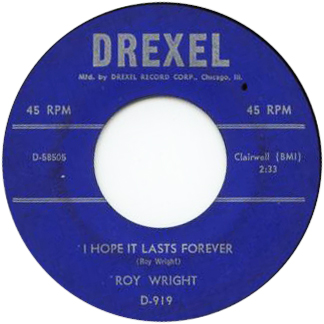
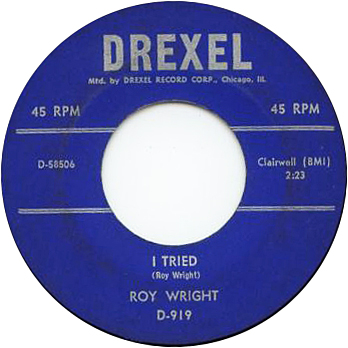
Roy Wright (voc); accompanied by prob. Denni Tillman (p, dir); unidentified (ts); unidentified (bars); unidentified (eg); unidentified (b); unidentified (d); unidentified females (backing voc -1).
Universal Recording, Chicago, 1958
| D-58505 | I Hope It Lasts Forever -1 (Wright) | Drexel 919 | |
| D-58506 | I Tried -1 (Wright) | Drexel 919 | |
| D-58507 | Who'll Volunteer -1 (Wright) | Drexel 918 | |
| D-58508 | True Love (Wright) | Drexel 918 |
Drexel 919 was Roy Wright's fourth and final single, as well as the final release by the company. It definitely came out in 1958; we assume that this was also the case for its companion release from this session, Drexel 918.
Our current view is that Roy Wright's previous four sides were the product of two sessions in 1957. However that may be, these four sides were defininitely not done at the same time as any of the previous four. The three female backing vocalists (prominent on "Who'll Volunteer" and "I Hope It Lasts Forever") give the session a slightly overproduced feel that Drexel had previously succeeded in avoiding. And "I Tried" is an effectively understated lament until that girl chorus comes in halfway through. "True Love" dispenses with their services. Also contributing to the overproduced feel are the absence of instrumental solos and the abundance of redundant piano triplets. The guitarist does get an occasional fill or flourish.
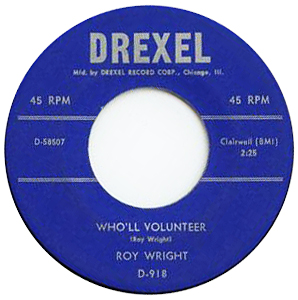
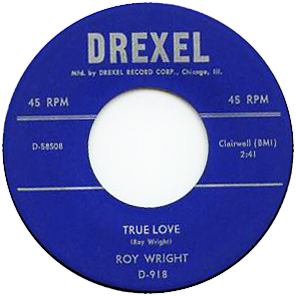
Roy Wright may have hoped it would last forever, but after his last two releases, the company quietly folded. We don't know whether Caldwell, King, or their behind-the-scene partner made further ventures into the music business.
During its 4-year lifespan, the company was responsible for 18 known releases. The Drexel release series ran sequentially from 901 through 919. The only missing item is 913, which we figure was passed over for superstitious reasons.
Until recently, the only reissues of Drexel material were doowop enthusiasts' "repros" of the vocal group 45s (with the addition of the first Ray Pettis single, transmogrified into a group recording through overdubbing on the infamous "Drexel 900"). Now there is a compilation on CD titled The Best of Drexel Records (DRCD-900). An obvious bootleg, with extremely cheap cover art and no liner notes, it is available from various Internet operations that cater to doowop aficionados. Working in its favor is the fact that the package includes 29 tracks on one disk, in good quality sound. Ray Pettis's two Christmas songs are omitted, along with "Small Town Man" by Dorothy Logan, "Later On in Life" by Hattie Randolph, and "I'm Gonna Tell It," "Please Baby Tell Me," and "You're My Girl" by Bobby Elvin. Its compilers were partial to the Gems, as they should have been. They also preferred the male vocalists over the females, and Roy Wright over Bobby Elvin—two choices that could be debated. A comprehensive treatment of the label's entire output would easily fit on 2 CDs, even if unreleased material is still extant. Despite the puny scale of the operation, Drexel always used Universal Recording and hired top quality musicians for its sessions, so all of its output remains highly listenable.
A various-artists CD from 2018, Windy City Dandies: Beat-Me-Down Rhythm & Blues Volume 1 was released as "Vee-Jay 102." It includes four sides by male vocalists from Drexel: Dave Turner's "I'm All Yours Sugar" (Drexel 906), "The Blind Boy" by Bobby Elvin (Drexel 910), and both sides of Drexel 912 by Roy Wright. All four appear to have been transferred from clean copies of the singles.
For our account of The Gems, we relied on Marv Goldberg and Dr. Robert Stallworth's 2004 article, now available in an update from 2009 at http://www.uncamarvy.com/Gems/gems.html. Much of their information was based on an interview with Ray Pettis. For the item about Denni Tilman, which came from the daily Chicago Defender for July 19, 1956, we are indebted to Suzanne Flandreau of the Center for Black Music Research at Columbia College in Chicago. Lesley Williams, Head of Information Services at the Evanston Public Library, provided the biographical information on Renda Pettis.
Click here to return to Red Saunders Research Foundation page.